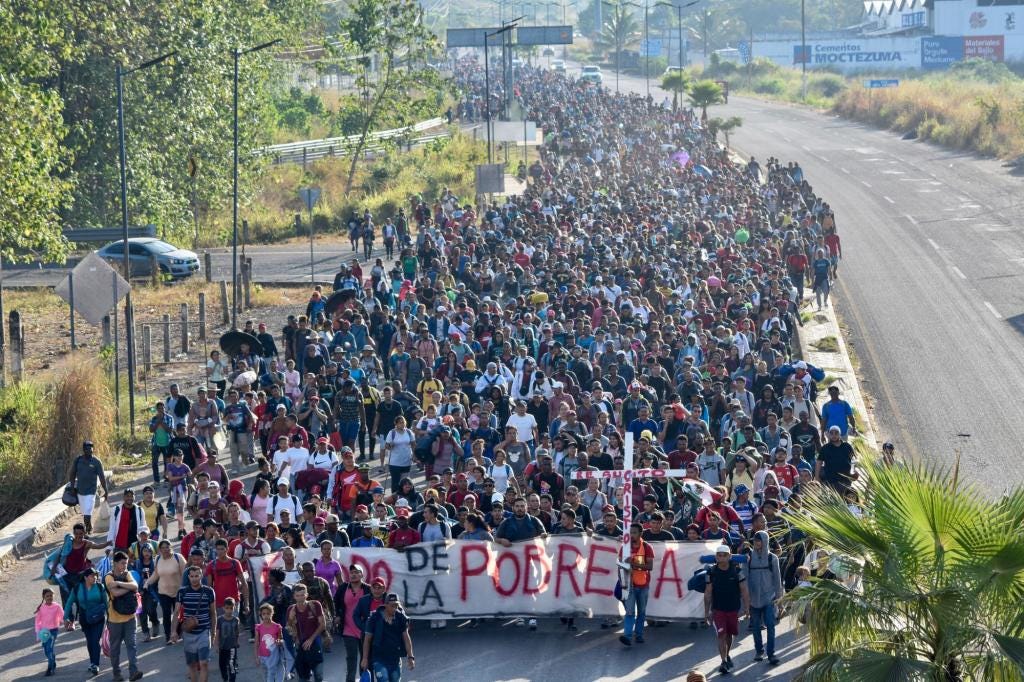
I hope everyone had an enjoyable New Year. I most certainly did. With 2024 now here, let’s resume discussion regarding we can expect in what’s certain to be a most eventful year.
Perception Vs. Reality
In the previous installment of The Next 12 Months series, I noted the American public underestimates illegal immigration by an order of magnitude. How far off is the estimate?
From a Harvard/Harris survey:
Data from Customs and Border Protection confirms: in Fiscal Year 2023 (which ran from October 2022 to September 2023), 3.2 million individuals made illegal entry into the country nationwide. In calendar year 2023 (January to December), the number is closer to 2.9 million. Along the U.S.-Mexico border alone, over 2.5 million crossed over illegally from January to December.
Regardless of which number you want to cite, most Americans are wrong in their guestimates as to the extent of illegal immigration. This doesn’t include those who didn’t get caught, or the number of illegals already residing in the United States, a number which will likely never be known for certain.
I made the observation that Americans believe exactly what President Joe Biden and the Regime would want the public believe concerning the reality of illegal immigration in the U.S. But no matter what anyone says, 100,000 to 1 million isn’t a drop in the bucket, especially when you factor in legal immigration and that it’s happening annually. Still, you can see why many Americans aren’t as concerned about illegal immigration as they ought to be. Scale is an important factor; as the infamous saying by Kurt Tucholsky (wrongly attributed to Joseph Stalin) goes, the death of one man is a tragedy, the death of millions is a statistic.
Last year, I explained the unique dynamic at play when it comes to immigration to America:
It’s difficult to get people, Americans and non-Americans alike, to understand the significance of the size of our country. The mind harbors a bias towards proportionality, so we think the dynamics that affect other countries must fit onto our own as well, and vice versa. The same way leftists think the U.S. should have the same kind of generous social welfare and universal health care system as Denmark and Japan, rightists think immigration impacts the U.S. the same way it impacts countries like France or the United Kingdom.
This is clearly not the case. The U.S. alone is the size of continental Europe and contains a large amount of habitable land. Thus, it’s easier to get away from it all. [Scott] Greer mentions Viktor Orban, the prime minister of Hungary, a country you can fit inside Kansas, while having over three times the population (9.6 million vs. 2.9 million). You can see quite easily why mass immigration would quickly overwhelm European countries while eliciting no more than a collective shrug out of the U.S. If you told most Americans the equivalent of Chicago’s population entered the country last fiscal year, the response from many would be a call to have them establish a brand-new city somewhere in the uninhabited part of the country. We’ve got room, don’t we?
But if 100,000 to 1 million isn’t a drop in the bucket, then over 3.2 million should definitely raise eyebrows, especially if this number is much higher than one’s initial estimate. Even if someone wants to make the argument that America has managed mass immigration in general fairly well, you cannot alter the demographics of a country so drastically and expect it to remain the same country. This is something that’s difficult for many Americans to grasp and it’s also a highly radioactive thing to say, but it shouldn’t be.
We all know that when someone else comes to live with you, it changes the whole dynamic of the place. If you bring in an entire family to live with you, it’s not going to be the same household, for better or for worse. On second thought, it’s not so much that we’re not allowed to say changing demographics changes the country, it’s that we’re allowed to say changing demographics can only change the country for the better.
This isn’t a cultural blog (go see
for that), so just know that it won’t happen today, it probably won’t happen tomorrow, but in about a generation, the country will look so drastically different, only a complete fool would deny mass migration had no impact on this country. Whether it was good or for ill, I suppose is up to each person to decide. There’s coming a point where indifference won’t be an option. Either you think mass immigration is a good thing or a bad thing.Still don’t care? One more factoid, then we’ll move on:
The cynic would say, well, it’s Americans’ fault they’re not having more children! Again, not going to get into that here, but just look at that and ask yourself: does that look like a healthy country? Does that look like a good way to sustain a society and forge nationhood? Once more, it depends on each person, but I’d hope that people can at least form a general impression without thinking too hard about it.
So here we are. We had more illegal immigrants enter the country than there were American births. Even a few years ago, many of our fellow Americans would’ve called you a paranoid, xenophobic conspiracy theorist for predicting such a future. It’s become difficult to ignore the fact that teeming masses, more than most of us imagined, are pouring over the border, and the people in charge can’t or won’t stop it.
Is 2024 the year immigration goes critical?
How To Think About Immigration
I don’t think I’ve ever explained my feelings on immigration before, so I’ll do it here: I’m a pragmatist and that attitude extends to immigration. Migration, the movement of peoples, is something humans do. They leave one place, move to another, establish roots, and maybe they pack up and do it all over again or their descendants do. It’s normal. We do it for a variety of reasons, but it typically comes down to this: life elsewhere is better than life where we’re at today.
It can also be a means of survival. As a prepper, immigration is something you may need to consider as part of SHTF-planning. If your country collapses into anarchy and it becomes obvious order won’t be restored for a long time, your only hope for survival may be to leave. I say this as someone who plans to stay, come what may, and hope everyone else would do the same.
But if it really gets that bad here and you do decide to leave, don’t feel bad or think you’re a hypocrite for it, either. I guarantee that many people whose literal blood is in that soil on which they stand, once upon a time, had some other place their ancestors called home. The idea that we should all just go back to where we’re from is a silly proposition, the refuge of the intellectually lazy.
Equally silly is that idea that there are no such things as borders, “we’re all immigrants,” or the idea this country cannot survive without immigration. Sure, we’ve become dependent on immigration, but only because we allowed it to happen. The worst that might occur, if we turned off the migration spigot, is that life gets more expensive due to a lack of cheap labor, but eventually, we’d manage - life’s getting more expensive even with an abundance of labor anyway, not to mention it’s harder to justify not raising wages when workers are less easily replaced.
But more important, a society is literally defined by its borders. You can love immigration all you want, but at some point, you have to decide: who is all this for? Land, money, resources, all of it’s limited. Whichever group you prioritize, you’re going to end up prioritizing someone, or everyone will ultimately suffer collectively, some more than others, obviously. Just as the problem with socialism is that you eventually run out of everyone else’s money, the problem with mass, unrestricted migration is that you eventually run out of everyone else’s land, money, and resources.
Put simply, restricting immigration is a survival mechanism. If you tell someone they can’t take up residence in your home, but they break in anyway and squat, you’re not going to compromise on that. You’d fight like hell to get them out. Why should countries be any different? If you don’t think a country has a legitimate claim to its land, then what says you have any more of a claim to your residence, your plot of land?
Immigration doesn’t make a country better, either. Not on its own. Like most things in life, it depends. Even if it’s, on balance, a good thing, there are always diminishing returns. One of the biggest incentives for immigration is cheap labor - after all, it makes goods and services cheaper in turn, and we all want that, right?
But once you import too much cheap labor, you provide no incentive for wages to go up, because someone will always take the job for less pay. Furthermore, the economy can only grow so much, so fast. Jobs, specifically low-paying, “gateway” jobs won’t always be available in the numbers required to accommodate new arrivals. How many custodians, laborers, and Uber drivers do you need, anyway? Even a massive country like the U.S. can only consume so many goods and services. At some point, the demand is met and excess labor becomes a sunk cost for society. And no, most of these migrants aren’t likely to achieve the “American Dream.” Economic growth is one thing, but prosperity requires capital and most of these migrants, who start off poor, will remain poor. Collectively, there’s not a lot of capital there. And life is getting more expensive in America, despite all this cheap labor.
In many ways, cheap labor isn’t so different from slavery. Involuntary servitude is considered among the gravest of moral injustices, but the inconvenient truth of it is that it was often done out of sheer economic necessity - agriculture was manpower-intensive. Yet slavery is actually an inefficient means of production and one of the reasons why it was phased out early in Europe and North America compared to the rest of the world is due to industrialization. Cheap labor in today’s economy might be more efficient, but, person-for-person, the benefits are quickly used up - people age, they move onto other things, stop working, or in some cases, they leave. I’m not trying to deliver an economics lecture, but my point is that the only way for cheap labor to yield returns is to continue bringing in cheap labor.
Lastly: a few weeks back, I saw someone on X (formerly Twitter) speak of how immigrants “embrace” new countries and how people should be grateful they did. This is backwards. The new countries embraced migrants, not the other way around. No migrant thinks: Hmm… that country needs me to make it better! I think I’ll leave behind everything and everyone I know and love, inconvenience myself, and make the long journey to start a new life in a place I’ve never lived before!
People move because they seek greener pastures. As a society, we’re sensitive to the feelings of minorities, but wait - didn’t they or their parents relinquish their status as racial/ethnic majorities in their old home to become minorities in their new home, in exchange for economic gain? If being a minority is that bad, why risk making the journey?
Attitudes need to change, but not just the attitudes of natives. Immigrants, children of immigrants, advocates of immigrants, all need to remember that nobody uproots themselves out of a sense of altruism. They do it out of self-interest. We should all understand, in many such instances, those who accept migrants are also taking a risk and they’re entitled to expect a reward, or to at least be able to say “no.”
Shifting Attitudes On Immigration
Former President Donald Trump’s success in 2016 came down in large part to his willingness to speak bluntly about illegal immigration. It’s critics felt empowered to talk about it, even as the Regime reacted by fiercely holding the line, coming just short of outright encouraging illegal entry into the U.S.
In eight years, have sentiments on immigration changed much? To understand what Americans are thinking, it must first be understood what the public thinks of immigration isn’t the same as what they think of immigration policy.
During those eight years, Americans have held positive views on immigration:
However, when it comes to illegal immigration, Americans are in an intolerant mood these days:
This is quite a shift from earlier in 2023, indicating perceptions, which concur with reality, had worsened considerably throughout the last year.
Data also suggests mass immigration in general isn’t something most Americans are too fond of, suggesting an instinctual understanding of its consequences:
The majority of Americans seem to regard 100,000 to 1 million as a “sweet spot.” Coincidentally, this is precisely the same as the number of illegals Americans believe to be entering the country annually. What’s going on there? Anyway, we’re assuming legal entry, meaning the fact approximately three million entered the country unlawfully in 2023 ought to be completely unacceptable to most Americans.
Still, there’s no question Americans are largely an inviting people. But like most people, Americans don’t appreciate it when their kindness is taken for weakness, either. An NPR/Ispos poll from 2022 showed over half of Americans characterized what was going on at the southern border as an “invasion.” The same poll showed that significant percentages of Democrats and Independents saw the situation at the southern border as problematic, even as percentages varied based on partisanship. As the numbers increase, the impact of illegal entry is becoming more apparent, and not only to the “MAGA” crowd.
Brian Silvas’ three dogs were usually the first to alert him that large groups of people were walking onto his San Diego County property. He’d wake up at all hours to Whisky, Soldier and Freedom barking incessantly. Today, the trio keep quiet most of the night. While the crowds of migrants have not stopped passing through, it’s become so common that the dogs now sleep through it.
“This country was built on immigration. I’m fine with that,” Silvas said. “But not like this. This is ridiculous.”
“Nation of immigrants” is conventional wisdom. It’s also wrong, but I won’t argue that point today. What I’ll say is this: even legal immigration is going to become increasingly toxic and untenable if mass illegal immigration continues unabated. The two aren’t as unrelated as people think. The data says clearly, I think, Americans wouldn’t want to take that many people into the country even if they arrived legally. Too much is too much.
More from CNN:
Two years ago, Silvas bought 78-acres of land on the Southern California border with Mexico, about 75 miles east of San Diego. His land is marked by hills and large boulders. The border wall ends a few feet into his property, leaving only the rocky desert terrain and a modest razor wire fence as a barrier.
“If I had the money, I would build my own wall right here!” Silvas said.
That’s all it took: the sight of total strangers trespassing on their property. No deep-dive analysis required. All that needed to occur was for people to see what happens when lots of people show up at once in disorderly, uncontrolled fashion.
I mentioned moments ago MAGA aren’t the only people who’ve had it with illegal immigration. In fact, they’re not even the driving force, not at this point. As large numbers of migrants show up in major cities, which have historically drawn newcomers, the tension and animosity has grown. For example, Black residents have been outspoken regarding the impact just several hundred migrants have had on their urban communities. The rhetoric has become heated and if it came from White residents, it’d be received quite differently.
At least one person, a Black woman and a member of the NAACP, discovered the hard way there are limits to their criticism of migrants.
The head of the Illinois Chapter of the NAACP has been suspended over her inflammatory comments about migrants.
Teresa Haley made the remarks during a Zoom call in October, where she labeled the more than 25,000 new arrivals 'savages' and 'rapists'.
The soundbite soon went viral, and eventually elicited both an apology from Haley, and a statement from the seminal civil rights group.
In a statement, the Baltimore-based agency confirmed it had suspended Haley, 58, on December 13 - the day before she issued her apology.
Here are her remarks in more detail:
The announcement, meanwhile, was issued on December 15, almost two months after Haley let loose in a recorded call with state leaders - where she appeared to channel a 2016-era Donald Trump.
‘These immigrants who come over here, they’ve been raping people, they’ve been breaking into homes, they’re like savages as well,’ she said.
‘They don’t speak the language and they look at us like we’re crazy,’ she continued, before turning to communities she said are being ignored.
The backlash among residents and politicians in Democratic strongholds and even “sanctuary cities” - places where immigration laws are effectively not enforced - has been significant, to say the least.
“I want to make it clear that our position here in Edison Township is that they’re not welcome here, they are illegal, and they belong on the other side of the border,” says Edison Mayor Sam Joshi.
The mayor went on to say, “I had directed my police department, as well as my emergency management to charter a bus that would take them straight back to the other side of the border if they were to actually come out. The good thing is they didn’t, they got the message and they just left Edison altogether.”
Edison Mayor Sam Joshi is of South Asian descent and a Democrat. He presides over a township that’s majority 60% non-White. The idea that anyone fitting that profile would toe such a hard line on illegal immigration was unthinkable a short time ago. You also need to go back at least a generation to hear mainstream leftists speak of illegal immigration in critical terms.
At the time, I was critical of the decision by Florida and Texas governors Ron DeSantis and Greg Abbott to ship illegal immigrants to places under Democratic governance, including self-described “sanctuary cities” - where immigration laws are effectively not enforced. I thought it to be counter-intuitive - we’re trying to lose, not gain, illegal migrants - and there’s also the moral hazard in playing with human life for political reasons. In retrospect, it was a genius move. It was a desperation play, no doubt, but really: how else could anyone have gotten Americans to take illegal immigration more seriously? It’s just not easy to get people to care about an issue unless it affects them directly. It’s only fitting that those who supported mass immigration be forced to confront its consequences instead of expecting those who never asked for it to do so.
It’s more true today than it was when these migrant “shipments” began in 2022. The federal government under Biden is more resistant than ever to allowing border states to enforce immigration laws.
AUSTIN, Texas (AP) — The Justice Department on Wednesday sued Texas over a new law that would allow police to arrest migrants who enter the U.S. illegally, taking Republican Gov. Greg Abbott to court again over his escalating response to border crossers arriving from Mexico.
The lawsuit draws Texas into another clash over immigration at a time when New York and Chicago are pushing back on buses and planes carrying migrants sent by Abbott to Democrat-led cities nationwide. Texas is also fighting separate court battles to keep razor wire on the border and a floating barrier in the Rio Grande.
But a law Abbott signed last month poses a broader and bigger challenge to the U.S. government’s authority over immigration. In addition to allowing police anywhere in Texas to arrest migrants on charges of illegal entry, the law — known as Senate Bill 4 — also gives judges the authority to order migrants to leave the country.
The lawsuit asks a federal court in Austin to declare the Texas law unconstitutional. It calls the measure a violation of the Supremacy Clause, which establishes that federal laws in most cases supersede state law.
“Texas cannot run its own immigration system,” the Justice Department states in the lawsuit. “Its efforts, through SB 4, intrude on the federal government’s exclusive authority to regulate the entry and removal of noncitizens, frustrate the United States’ immigration operations and proceedings, and interfere with U.S. foreign relations.”
The Biden administration is justifying the lawsuit by accusing Texas of overstepping its authority. I’m not sure that’s any kind of leg to stand on, when the Biden administration is not only refusing to do its minimum duty of protecting the country’s borders, while expecting border states like Texas to shoulder a disproportionate amount of the burden in dealing with what’s effectively an invasion.
The Biden administration asked the U.S. Supreme Court on Tuesday to permit Border Patrol agents to cut razor wire at the U.S. border with Mexico that Texas officials constructed to prevent migrant crossings.
The reasoning?
“Texas’s barriers in Eagle Pass impede agents’ ability to apprehend and inspect migrants under federal law,” Prelogar argues.
But the migrants are being allowed into the country, anyway. The idea that border barriers like barbed wire are preventing Border Patrol from doing its job is completely disingenuous, when it’s the federal government under Biden that’s preventing agents from defending the border.
At some point, you have to conclude: the Biden administration is allowing all these people in. If that’s the case, then neither Texas nor any other border state should bear the burden of accommodating these people. If anything, those who supported the importing of millions in this exact fashion are the ones who should bear the burden. The decision to open the borders and allow the flood of masses was never something that was agreed upon by the American people, no matter their attitudes on immigration.
There was always going to be a backlash. It was just a question when and in what form. We’re now in its early stages, with little doubt the issue will play a major role in deciding the elections of 2024.
Are We Being… Replaced?
Americans appear to be close to a consensus that illegal mass immigration is happening and an increasing number of people seem to agree that it’s more problem than benefit. How about on the matter of “why?” Do we agree on the reason it’s happening?
As before, the question of why it’s happening is distinct, but related to why the Regime doesn’t seem to be trying to stop it. People migrate to better their lives. There may even be some sleepers in the mix, attempting to infiltrate the country as a form of covert, subversive warfare waged by hostile actors abroad. For now, I don’t think there’s any need to get into any more detail into what’s driving illegal migration, because it’s actually less important than the question of why American political leadership at the very top have no intention of addressing the crisis with any sense of urgency.
Many of you have heard the phrase “The Great Replacement.” It’s yet another radioactive term, though it ought not to be. For one, it’s misunderstood. It’s not, as critics claim, a far-right conspiracy theory alleging that mostly Western states are deliberately swapping out their native peoples with foreigners, particularly from the developing world.
Rather, The Great Replacement, the brainchild of liberal French writer Renaud Camus, refers to the logical outcome of a society that’s lost its culture, lost its identity, and is attempting to fill the void by bringing in new cultures and people in hopes it can revitalize and sustain the nation. Unfortunately, the opposite occurs, since a society that’s lost it’s identity has nothing to sustain, so it gradually ends up becoming replaced in the process.
Even in its most benign state, The Great Replacement is nonetheless controversial. The only way to learn what it actually means it to hear it from the horse’s mouth. If you’re looking for some new reading material, buy (not borrow) Enemy of the Disaster: Selected Political Writings of Renaud Camus, which includes “The Great Replacement” essay. Don’t just read the one essay, either; read the entire book, cover to cover. To understand what Camus means by “The Great Replacement,” you to understand the broader context in which he speaks. As usual, the media takes something which sounds insidious and turns it into something it’s not, forcing the public to learn facts which are actually lies.
Does that even matter, though? Regardless of which definition of “The Great Replacement” you buy (I favor the original Camus definition), the fact is, Americans seem to believe that there is deliberate intent on the part of authorities driving illegal migrants into the country.
Rasmussen Reports recently polled Americans on the sentiment. The results may or may not surprise you:
Note there isn’t much difference among the races. It’s rare to see this sort of concurrence among a broad swath of Americans and these results were unthinkable a short time ago. That said, I wouldn’t assume that people who believe in the phenomenon all think it’s a bad thing. Conventional wisdom has held that White Americans have the most to lose as a consequences of The Great Replacement, since they are the majority and our country has long been defined by Whites more than any other race.
I can’t find a more recent example of such a poll, but in 2021, most Americans appeared indifferent to the prospect of Whites comprising a smaller share of the population:
As you might expect, leftists are more likely to believe it to be a good thing, but what really stands out is the 18-29 age group who agree. This is obviously due to the diversity of America’s young, but also the result of indoctrination through education and media. I have no idea how this trend is going to play out in the years and decades to come.
What I do know is that the Left may express alarm at the mention of “The Great Replacement,” but they, more than anyone else, not only believe it, they think it’s a great thing.
wrote in Newsweek back in 2022:But there’s a small problem: Democrats and progressive activists, based on their own rhetoric over the years, subscribe to “replacement theory” more than anyone else. As vice president, Biden himself said that a “constant” and “unrelenting” stream of immigration would reduce Americans of “white European stock” to an “absolute minority,” and that this was “a source of our strength.”
Biden is now president. His actions today are fully consistent with what he’s said about the declining proportion of Whites in the country. Perhaps no other president has validated The Great Replacement as fact more than the far-left Biden has.
And:
In 2013, Politico concluded that amnesty for millions of illegal aliens “would produce an electoral bonanza for Democrats and cripple Republican prospects in many states they now win easily.” The following year, James G. Gimpel, a professor of government at the University of Maryland, College Park, published a study that found the “flow of legal immigrants into the country—29.5 million from 1980 to 2012—has remade and continues to remake the nation's electorate in favor of the Democratic Party.”
Whether they arrive legally or illegally, it doesn’t matter, since the distinction is meaningless to the Left. What you need to know is that the Left not only believes in The Great Replacement, but they benefit from it and seek to build an entire political order out of it. So much for a conspiracy theory.
Yet now, there appears to be buyer’s remorse, dare I say backlash, even among those who may have felt the decline of America’s White population to be for the better. The fact that Americans of all races and even younger Americans believe the government to be promoting mass immigration in an attempt to replace existing Americans suggests even non-Whites are feeling vulnerable to replacement. Whites are, after all, still the majority, so it’s going to take longer to replace them, whereas other races comprise a much smaller proportion of the population and occupy the parts of the country which will receive the lion’s share of new arrivals. It’s not a new phenomenon, either. Consider infamous Compton, California. In 1990, over half the population was Black. Today? It’s approximately a quarter. Meanwhile, Hispanic/Latinos went from comprising around 43% to over 70% of the city’s population during the same timeframe.
If that’s not replacement, I don’t know what is. This is a phenomenon playing out cross-country and all races are subject to it.
People believe in The Great Replacement because it’s really the only logical explanation for what’s happening. Even if the government can’t stop this, it doesn’t change the fact it set the stage for things to get to this point and that they’re not even trying to stop it, even as a symbolic gesture. It’s also apparent that the Regime isn’t just pro-immigration; it’s pro-illegal immigration, even if it never explicitly says so. Either people can enter this country unlawfully or they can’t. There’s no gray area here, regardless of how sensitive you are to the plight of migrants. It’s for that very reason the Left has spent years conflating legal and illegal immigration, as if the difference comes down merely to a matter of paperwork.
Besides, these masses of millions aren’t tourists. They’re coming to stay for the long haul, even if some eventually go back. Even if they all did leave one day, they’re not going to put everything back the way it was when they first arrived. The Regime is aware of this, suggesting they’re expecting some sort of pay-off one day. They may be illegal today, but as the Left tightens its grip on governance, the implication is that amnesty will be afforded to a large degree to these migrants and they’ll provide the votes necessary to establish indefinite single-party rule by the Democratic Party. As for the ones who don’t receive a pathway to legalization, they can certainly serve as shock troops enforcing anarcho-tyranny.
The Left is playing with fire, however. Even when in complete command, the Regime cannot afford to lose control of the situation, either. I think the backlash you see even by some on the Left shows that people are aware the situation is spinning out of control. Yet once control is lost, it’s difficult to re-establish order, absent brute force.
I don’t think there ought to be any debate over the validity of The Great Replacement. It’s real and it’s happening. But if you’re still on the fence, consider: the state’s first duty is to guard it’s own borders. If it can’t, we don’t have a country. If we don’t have a country, then what use does its government serve? If it won’t, why wouldn’t unless it wants all these people to enter the country?
What To Expect In 2024
Immigration will absolutely be a major campaign issue during the 2024 election. President Biden, seeking re-election, can only downplay the significance of immigration. The problem has gotten so far out of control and he’s receiving so much backlash from even his own constituency, there’s simply not enough time for him to turn things around. All he can do is re-focus the public’s attention on another issue entirely, namely his likely challenger, Donald Trump, and the threat to democracy he supposedly poses.
That said, there are apparently indications Biden is willing to take immigration more seriously, but I’m not holding my breath. For one, Biden appears to view immigration as an issue he can play politics with Republicans over, proving he not only doesn’t take the matter seriously, but that he regards illegal migrants as bargaining chips, at best, and weapons, at worst, against his political opponents. Don’t make me keep bringing them in seems to be his message, in line with his place in history as the president who validated The Great Replacement. Politics aside, the immigration problem is so out of hand, there’s nothing he’s willing to do that’d come anywhere close to solving the problem.
At this point, mass deportations and closing the border (requiring use of the military) are the only serious options, but Biden is likely to do neither, as he’d raise hell among more influential members of his own constituents, his party, and across the country. On a more practical note, I doubt the U.S. even has the law enforcement officers or troops to do so either. And before anyone mentions Operation Wetback, not only do we have far more illegal residents today than we did in 1954, Wetback was regionally-focused. To execute a similar operation at the scale required today exceeds our capabilities.
So unfortunately, we’ve passed the point of no return. Realistically, the last time mass deportation and border closing might’ve been feasible was probably the 1980s. Even if someone like Trump returned to office and put together a cohesive plan to get illegal immigration under control, he’d likely encounter intransigence from the agencies most responsible for implementing policy - Defense and Homeland Security.
Under existing leadership, the military would likely push back hard against a border mission. For all his shortcomings, Trump’s first Secretary of Defense, Jim Mattis, dutifully obeyed his commander-in-chief, effectively blunting fierce criticism from the media in the process. Under today’s leadership, however, you’d likely see open revolt just short of blatant disobedience, especially if someone like Trump became president again. The military has become so politically compromised by the Left, its leaders would probably reflexively recite the Democratic Party’s platform on immigration in response, while mobilizing both the bureaucracy and its public relations apparatus as they did in 2020 to hinder the president and make the atmosphere toxic to the point where the president cannot even give a lawful order.
Even if the order was given, I don’t know how effective the military would be at the mission of defending the border. It’s been almost a century since it last performed the this role and so much of the military is still focused on foreign threats, even though the likelihood of the U.S. fighting another major overseas war diminishes by the day. Without necessary expertise, but most important, leadership, the military may end up merely lining up behind agencies like Border Patrol and attempt to avoid having to do anything, or worse, they may just allow the migrants in. After all, who’s really ready to shoot unarmed migrants?
Last year, I wrote about an impending armed conflict along the U.S.-Mexico border. I doubt the shooting will begin in 2024, but if the likelihood of war seems low today, it’ll seem much higher by year’s end. It’s inevitable; show me a single country whose border was so insecure, so afflicted by violence, yet managed to avoid armed conflict or being conquered.
The border war will be a major problem, no doubt, but not only is it a good ways off in the future, it’ll be far enough for most Americans, it’ll preoccupy our collective attention less than even events in Ukraine or Israel have, odd as that sounds. The real conflict will occur much deeper within, in our cities, metropolitan areas, even smaller cities and towns far removed from the U.S.-Mexico border are seeing new residents from Latin America or even Africa and the Middle East.
The problems illegal mass migration pose to the U.S. can be summarized as: replacement to forge single-party statehood, stressing the economy and public services, contributing to crime and disorder, declining quality of life, and cultural change brought about by demographic alteration. Some of these problems are arguably more immediate than others, though all urgent. Replacement and demographic alteration are longer-term issues, but they’ll certainly manifest in our lifetimes. In 2024, the bigger danger is the stressing of the economy and public services, crime and disorder, and declining quality of life. I don’t anticipate a drastic changes to either, but like most things, you won’t notice changes day-to-day, anyway. You’ll notice them next January, the same way you notice the world looks different today than it did last January.
Still, I don’t think migration will have the same impact on the U.S. as it has in Europe. For one, I don’t think the U.S. is at risk of Islamization the way France and even the United Kingdom has become. If anything, America faces a risk of Catholicization owing to the large number of migrants from Latin America (I say this mostly sarcastically; de-Christianization is pervasive, making it an unlikely scenario). Some places, like Minnesota, do face an Islamization problem, but I think this is going to be primarily a local issue.
Beyond these areas, don’t think we’ll see most of our cities become like Birmingham, England, or Marseille, France. The issues we face will be more like the issues our neighbors to the south face, which is hardly reassuring. Country-to-country comparisons eventually fall flat, but I’d say America’s future looks like a mixture of Brazil, South Africa, and a milder, but still significant dose of the UK and France. The way to look at illegal immigration isn’t as the source of our problems, but an accelerant, fuel that’ll exacerbate problems this country already has.
In closing, I’ll leave you with these images that hopefully underscore the magnitude of the crisis, while giving you an idea of what the future holds in store.
Here’s what the border looks like daily:
https://twitter.com/AliBradleyTV/status/1741954186374250797
For perspective, consider:
Like I said, you eventually run out of land, money, and resources.
So Much To Talk About
Immigration is a topic of epic proportions. Even in this long piece, I still haven’t touched every aspect of the issue. Some of this is because I’m trying to focus on bigger, broader trends instead of hyper-focusing on details which may not manifest in our own lived experiences.
Details I haven’t delved into include the increasing proportion of migrants from Africa and Asia (including the Middle East), the fact that most of the migrants are able-bodied males of fighting age, and the possibility that they could be employed by someone, including our own government as a fighting force. I even heard someone in my own personal life, who’s no right-winger, openly contemplate that possibility. The Regime may prefer people not notice, let alone talk about, what’s happening at the border. But when the fire rages out of control, you’re not going to pretend like the blazing hear is coming from the sun.
Anyway, this is why readers exist. What are your thoughts on what’s going on at the border? Has immigration, legal or not, had a tangible impact where you are over the last year? Do you believe in The Great Replacement? Let’s talk about it in the comments.
Max Remington writes about armed conflict and prepping. Follow him on Twitter at @AgentMax90.
If you liked this post from We're Not At the End, But You Can See It From Here, why not share? If you’re a first-time visitor, please consider subscribing!



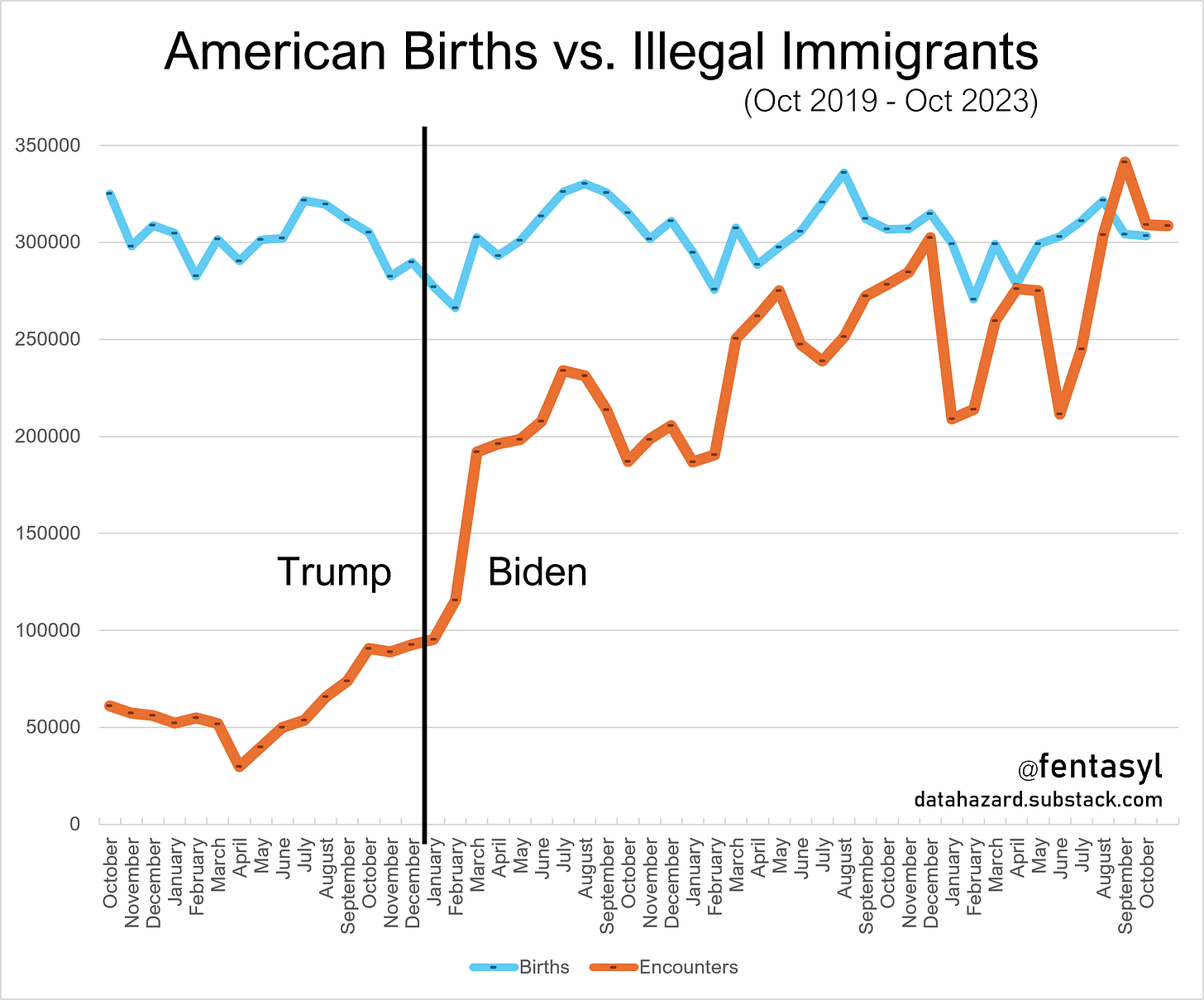
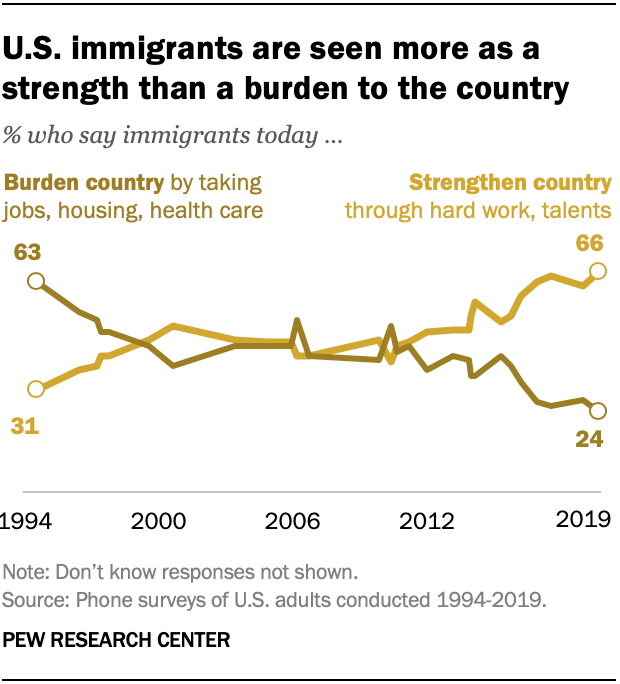
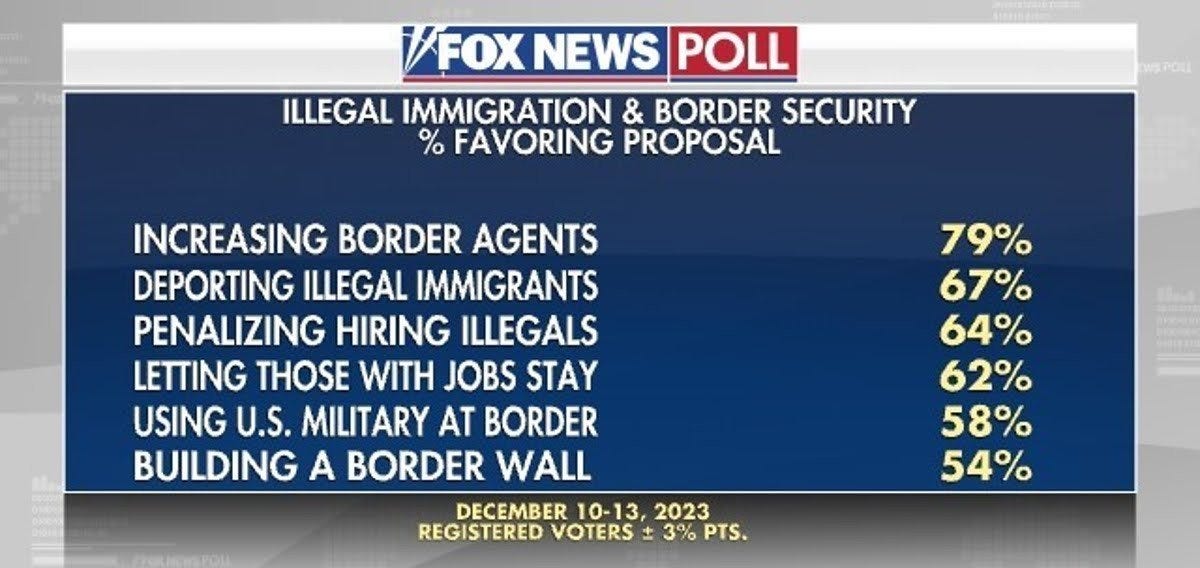
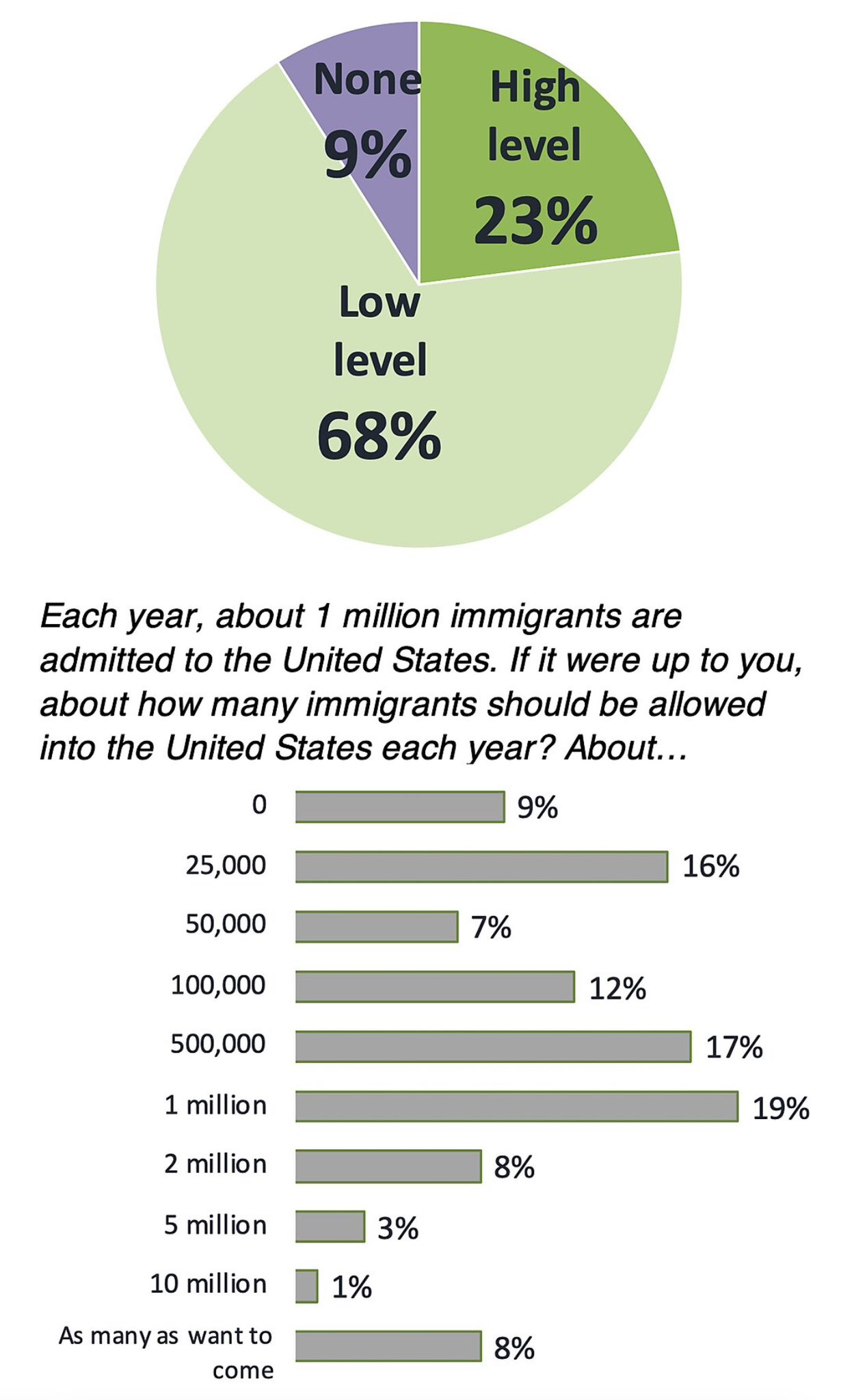
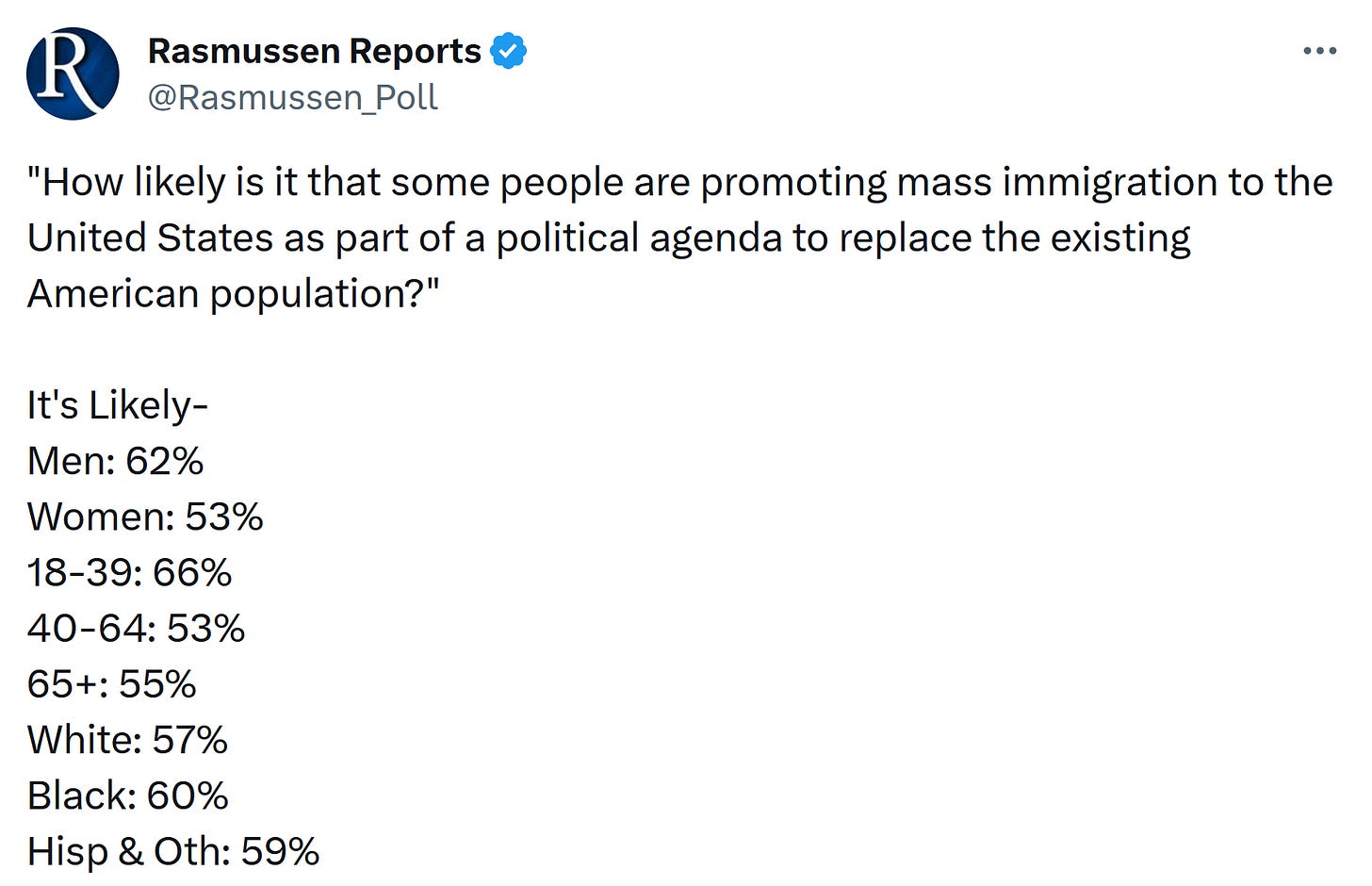
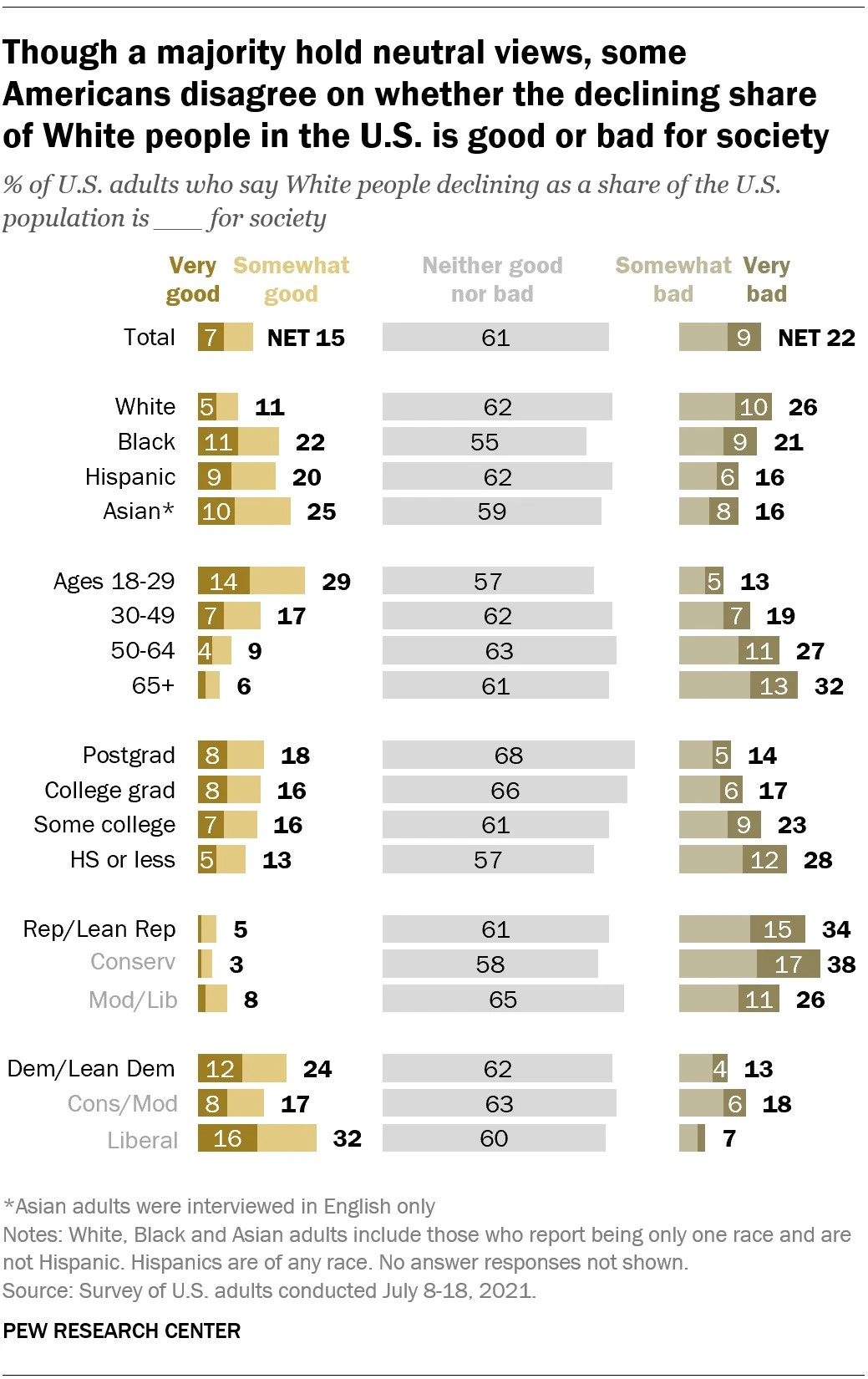

Defend ourselves or perish.
The enemy is the regime.
Mass deportation is a top-down solution, and it's true we lack the resources to do it. But how could we crowdsource our immigration enforcement? We turn millions of employers into (unwilling) immigration agents.
Make it impossible for illegals to get legal work and they will 1) commit crimes and get arrested which will result in their deportation; or 2) leave of their own accord. The federal govt has ample tools at their disposal to apply pressure to employers, and additional tools like mandatory e-Verify could be provided. Bottom line, you make it dangerous to knowingly hire illegals (and I mean prison time not just fines), this problem gets solved quickly.
Our elites (incl Donald Trump) will not do so though. The bipartisan, professional-managerial class benefits too highly from cheap labor.